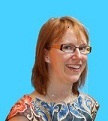Patients’ Week 2011: “The essence of Health 2.0 is collaboration”
How being an informed patient helps Sara Riggare, who has Parkinson’s disease, achieve her goal of chronic health

Sara Riggare is a 40-year-old Swedish engineer working in the field of health informatics and patient collaboration in healthcare (www.chimes.se).
Sara experienced her first symptoms of Parkinson’s disease (PD) in her early teens, around 1984, but was not correctly diagnosed until 2003.
Her symptoms are mainly related to balance and gait problems, slowness of movement and rigidity, but by making sure she is optimally medicated she still leads a very active life.
Sara calls herself an optimistic realist with PD and can be followed on her blog and on Twitter @SaraRiggare.
She is also involved in the recently launched www.parkinsonsmovement.com
Why did you choose to become an informed patient?
Well, it was not a conscious decision, not to start with. To start with, I only did what I always do when I find myself in an unknown, unpleasant or uncomfortable situation: I try to find as much information as possible in the hope that what I find might help make the situation less “un”. More often than not, I find more information than I can make use of at the time, but then I file it under misc., and mostly it clicks nicely into place sooner or later.
However, I am well aware that we are all individuals, in sickness as well as in health, and we all have the right and responsibility to make our own decisions. Some of us don’t want to know as much about our diseases and ailments and everybody has to be respected for their opinion.
How has Health 2.0 helped keep you informed?
My day, every day, starts with my alarm going off at 6 a.m., when it’s time for my first dose of medications. My pre-breakfast snack, which indeed is the most important meal of my day, consists of six very carefully selected pills of different shapes, sizes and colors. They literally make my day. Without them, my life would be very different. I would most probably be more or less immobile and, as a result of that, suffer a premature death. But this way I can really enjoy my 41st year on this planet as well as my 9th year as the proud mother of my beautiful daughter, my 28th-ish year with symptoms of a neurodegenerative disease, and the 19th-ish year on regular medication.
Throughout my day I take medications in different combinations another five to six times and, to keep track of the times and combinations, I have used different methods over the years: alarm clocks, devices designed for holding my medications as well as alerting me when to take them, reminders on an ordinary mobile phone. However, none of these were used for any length of time; they just didn’t provide the true benefit. Not until I found my first really useful smartphone app, I realized the enormous potential that this area carries. By the way, my first fave app was not in any way related to PD, but is an app that every fertile female will find totally indispensible, PD or no PD.
For me, the essence of the concept of Health 2.0 is collaboration, collaboration for creating health. Because as a “sufferer” (not my favorite word) of a chronic disease, I know that although my health is more in the mind of myself than in the eyes of my doctor, I still need my extensive team of a variety of resources ranging from the pharmacy to the gym via all sorts of healthcare professionals to achieve my goal: chronic health!
For everything patient-related, join the sector’s other key players at Patient Adherence, Communication and Engagement (PACE) USA on October 24-25 in Philadelphia. Download the full PACE agenda and speaker line-up here. Want to know more? Contact laura@eyeforpharma.com.
To read our Patients’ Week stories from 2010, see Patients’ Week 2010.
For all the latest business analysis and insight for the pharma industry, sign up to eyeforpharma’s newsletters.
